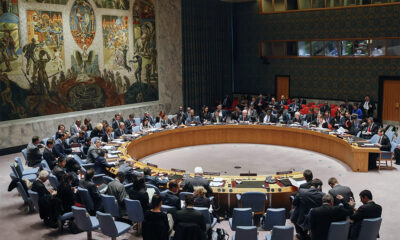COVID-19
IOC reassures anxious Japan that Olympics will be safe

The International Olympic Committee (IOC) reassured an anxious Japan on Wednesday that the Tokyo Olympics would be safe for athletes as well as the host community, amid mounting opposition to the Games and fears it will fuel a spike in COVID-19 cases, Reuters reported.
Speaking in Tokyo alongside senior Japanese officials, IOC chief Thomas Bach said he believed more than 80% of residents of the Olympic Village would be vaccinated or booked for vaccination ahead of the Games set to start on July 23.
He rejected growing calls to cancel the global sporting showpiece, already delayed once due to the pandemic, saying that other sporting events had proved the Olympics could go ahead with strong COVID precautions, Reuters reported.
Bach’s comments came as Japan kept up a battle with a fourth wave of infections though its slow vaccination campaign has undermined already shaky public confidence that the Games should proceed.
“Together with our Japanese partners and friends, I can only re-emphasise this full commitment of the IOC to organise safe Olympic and Paralympic games for everybody,” Bach said.
“To accomplish this, we are now fully focused on the delivery of the Olympic Games.”
Less than 30% of medics in Japan’s major cities have been vaccinated against the coronavirus, with just 65 days left to the start of the Olympics, the Nikkei newspaper said.
Cabinet figures showed this week that three months into Japan’s vaccination push, less than 40% of its medical workers were fully inoculated, Reuters reported.
The problem is especially pronounced in the capital, Tokyo, which plays host to the Games, and other large population centres, where the rate of fully vaccinated medical workers was less than 30%, the Nikkei added.
Much of the vaccine supply was concentrated in large hospitals, and there had been problems in the reservation systems for medical staff, it said.
The slow pace of vaccinations of doctors and nurses has been among the complaints cited by medical groups that oppose the Games.
Bach said the IOC would do its part to keep the Japanese public safe, by having additional medical personnel as part of the NOC delegations to support the medical operations and the strict implementation of the COVID 19 countermeasures, Reuters reported.
COVID-19
WHO declares end to COVID global health emergency

The World Health Organization said Friday that COVID-19 no longer qualifies as a global emergency, marking a symbolic end to the devastating coronavirus pandemic that triggered once-unthinkable lockdowns, upended economies and killed millions of people worldwide.
The announcement, made more than three years after WHO declared the coronavirus an international crisis, offers some relief, if not an ending, to a pandemic that stirred fear and suspicion, hand-wringing and finger-pointing across the globe, AP reported.
The U.N. health agency’s officials said that even though the emergency phase was over, the pandemic hasn’t finished, noting recent spikes in cases in Southeast Asia and the Middle East.
WHO says thousands of people are still dying from the virus every week, and millions of others are suffering from debilitating, long-term effects.
“It’s with great hope that I declare COVID-19 over as a global health emergency,” WHO Director-General Tedros Adhanom Ghebreyesus said.
“That does not mean COVID-19 is over as a global health threat,” he said, warning that new variants could yet emerge. Tedros noted that while the official COVID-19 death toll was 7 million, the real figure was estimated to be at least 20 million.
Tedros said the pandemic had been on a downward trend for more than a year, acknowledging that most countries have already returned to life before COVID-19.
He bemoaned the damage that COVID-19 had done to the global community, saying the pandemic had shattered businesses, exacerbated political divisions, led to the spread of misinformation and plunged millions into poverty.
When the U.N. health agency first declared the coronavirus to be an international crisis on Jan. 30, 2020, it hadn’t yet been named COVID-19 and there were no major outbreaks beyond China.
More than three years later, the virus has caused an estimated 764 million cases globally and about 5 billion people have received at least one dose of vaccine.
In the U.S., the public health emergency declaration made regarding COVID-19 is set to expire on May 11, when wide-ranging measures to support the pandemic response, including vaccine mandates, will end. Many other countries, including Germany, France and Britain, dropped most of their provisions against the pandemic last year.
When Tedros declared COVID-19 to be an emergency in 2020, he said his greatest fear was the virus’ potential to spread in countries with weak health systems.
Most recently, WHO has struggled to investigate the origins of the coronavirus, a challenging scientific endeavor that has also become politically fraught.
COVID-19
COVID-19 in Iran: Nearly 900 new cases, 24 deaths recorded

The Iranian health ministry announced on Sunday that more than 890 new cases of COVID-19 have been identified across the country during the past 24 hours, adding that 24 patients have died in the same period of time, Fars News Agency reported.
“A sum of 891 new patients infected with COVID-19 have been identified in the country based on confirmed diagnosis criteria during the past 24 hours,” the Iranian Health Ministry’s Public Relations Center said on Sunday, adding, “454 patients have been hospitalized during the same time span.”
The ministry’s public relations center said 611 people infected with COVID-19 are in critical condition.
COVID-19
China says 200 million treated, pandemic ‘decisively’ beaten

China says more than 200 million of its citizens have been diagnosed and treated for COVID-19 since it lifted strict containment measures beginning in November.
With 800,000 of the most critically ill patients having recovered, China has “decisively beaten” the pandemic, according to notes from a meeting of the ruling Communist Party’s all-powerful Politburo Standing Committee presided over by President and party leader Xi Jinping, AP reported.
China enforced some of the world’s most draconian lockdowns, quarantines and travel restrictions and still faces questions about the origins of the virus that was first detected in the central Chinese city of Wuhan in late 2019. Heavy-handed enforcement prompted rare anti-government protests and took a heavy toll on the world’s second-largest economy.
The official Xinhua News Agency quoted Xi as saying that policies to control the outbreak had been “entirely correct.” The abrupt lifting in November and December of the “zero COVID” policy that had sought to eliminate all cases of the virus led to a surge in infections that temporarily overwhelmed hospitals.
Case numbers have since peaked and life has largely returned to normal, although international travel in and out of China has yet to return to pre-pandemic levels.
China is now transitioning to a post-pandemic stage after a fight against the outbreak that was “extraordinary in the extreme,” Xinhua said.
The government will continue to “optimize and adjust prevention and control policies and measures according to the times and situations with a strong historical responsibility and strong strategic determination,” Xinhua said.
-

 Sport4 days ago
Sport4 days agoACL draw to be broadcast live on ATN channels
-

 Business5 days ago
Business5 days agoAfghanistan reaches self-sufficiency in production of 133 items: MoIC
-

 Regional4 days ago
Regional4 days agoIRGC chief warns of harsher response if Israel attacks Iran
-

 Health5 days ago
Health5 days agoMajority of Afghans with mental disorders are women: officials
-

 World5 days ago
World5 days agoOne killed, 10 injured in cable car accident in southern Turkey
-

 Regional4 days ago
Regional4 days agoIran launches retaliatory attack on Israel with hundreds of drones, missiles
-

 Sport3 days ago
Sport3 days agoACL fever grows as fixtures finalized
-

 Latest News4 days ago
Latest News4 days agoContact group on Afghanistan hits roadblock over Pakistan’s gripe with India

























